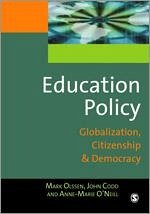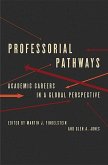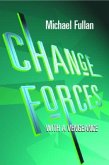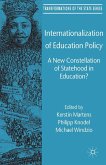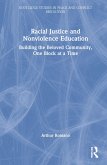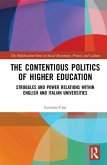`Education policy is now a global matter and all the more complex for that. Mark Olssen, John Codd and Ann-Marie O'Neill do us an invaluable service in producing a carefully theorised guide to current issues and key concerns - this is an important, erudite and very practical book' - Stephen J Ball, Education Policy Research Unit, University of London `Given the global reach of neoliberal policies, we need cogent books that enable us to better understand the major effects such tendencies have. Education Policy is such a book. It is insightful and well written--and should be read by all of us who care deeply about what is happening in education in international contexts' - Michael W Apple, Author of 'Educating the "Right" Way and John Bascom Professor of Education University of Wisconsin, Madison `I really am taken with the book, the range and depth of analysis are truly impressive. This book is a magnum opus and everyone in the area should read it'- Hugh Lauder, University of Bath `In their insightful and comprehensive book on education policy Mark Olssen, John Codd and Anne-Marie O'Neill wrestle with the big questions of citizenship and democracy in an age of globalization. They argue that ducation policy in the 21st century is the key to security, sustainability and survival. The book, anchored in the poststructuralist perspective of Michel Foucault, traverses the whole territory of education policy not only methods and approaches of policy analysis and the dominant political perspectives that influence policy-classical liberalism, social democracy and neo-liberalism--but also those policy areas that require the closest scrutiny: markets, trust, professionalism, choice, diversity, and finally, community, citizenship and democracy. This is the new policy bible for educationalists - it is at once systematic, provocative and instructive' - Michael A Peters, Research Professor, University of Glasgow 'It is rare indeed for books with such ambitious scope as this one to appear within educational scholarship... This is an important book for any graduate student who is undertaking work on any aspect of education policy' - Education Review This book provides an international perspective on education policy, and of the role and function of education in the global economy. The authors present a Foucauldian perspective on the politics of liberal education, within a theoretical framework necessary for the critical analysis of education policy. The authors set out the analyses necessary for understanding the restructuring in education and social policy that has occurred in many countries affected by the resurgence of neo-liberal political theory. They examine education policy in relation to globalization, citizenship and democracy. The authors argue that globalization is an extension of neoliberalism and is destructive of the nation state, community and democracy. They show the importance of education in building strong democratic nation states and global communities based on cultural identity and inter-cultural awareness. This book is essential reading for students of education policy studies and social policy analysis.
Hinweis: Dieser Artikel kann nur an eine deutsche Lieferadresse ausgeliefert werden.
Hinweis: Dieser Artikel kann nur an eine deutsche Lieferadresse ausgeliefert werden.

